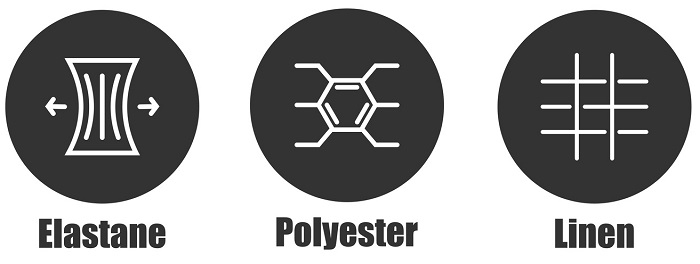

Fabrics are very significant in the textile industry. Various clothes are made from different fibers. Different fibres have different properties and qualities, which make them distinguishable from others. Some are simple to care for, while others are challenging. Some are good at absorbing moisture, while others are not.
Nylon and acrylic are popular synthetic fibres that are used all over the world. Synthetic fibres are not biodegradable, which makes them harmful for the environment. But these types of fibres are very useful in industries like apparel, aerospace, electrical, and electronics. This increases the use of synthetic fibres across the world.

Nylon is the name of a family of synthetic polymers. These polymers are widely used in the making of apparel and consumer goods. Nylon is a pure synthetic fiber, which means no organic material is involved in the process of making it.
Nylon was first used in the search for a silk substitute. The popularity of nylon increased in the 1940s, but in the 1970s, the use of nylon decreased. Due to the negative impact on the environment, people started avoiding nylon. Petroleum oil is the main ingredient of nylon, which makes it a non-biodegradable fibre material. Nylon undergoes the following steps
Extraction of diamine acid
Combining
Heating
Extrusion
Loading
Stretching
Drawing and Spinning
Finishing
Nylon fabric is widely used in the making of women’s stockings and sportswear. It is used in making tight clothes. Nylon was originally developed in the United States. But as the popularity of the material increased worldwide, various countries started producing nylon. Types of nylon include: nylon 6, nylon 46, nylon 510, and nylon 1. Nylon is produced using a significant amount of energy and waste materials. Due to this, nylon is considered harmful to the environment. It carries various pollutants, which pollute the atmosphere. It is important to take good care of the place where it is made. Due to its toxic ingredients, it can create massive problems in the lives of people.
Acrylic fibre is a fossil-based fiber, which makes it a synthetic fiber. It is made from a synthetic polymer called acrylonitrile. Typically, this fibre is produced by reacting certain petroleum- or coal-based chemicals. The nature of acrylic fibre is unbreathable, which allows it to be used to make athletic equipment. Acrylic fibre is widely found in hoodies, tracksuits, and athletic pants.
In the 1940s, Dupont invented acrylic fiber. Over time, it became noticeable and was used worldwide. Acrylic fibre is then used as one of the constituents of carbon fibre in industrial applications. Along with this, acrylic is widely used for knitting purposes. It is cheap and low-effort fiber. Different types of acrylic fabric include acrylic, modacrylic, nytril, and lastrile.
Acrylic fibre contains the most acrylonitrile. It undergoes the following steps
Polymerization
Dissolving
Extruding
Wet or dry spinning
Washing and stretching
Loading
Weaving
China is the global leader in the production of acrylic fabric. The production in China is higher than 30%. Although there are other countries, South America is the world’s fastest-growing acrylic marketplace. This fibre is a non-biodegradable fiber. Due to its nature, it is highly volatile, which allows it to become highly flammable. Along with this, a number of toxic substances are used in the making of acrylic, which is very harmful for the environment. Acrylic is also hazardous to your health.
Nylon and acrylic have some similarities, but due to differences in the manufacturing process, they can be distinguished on a variety of grounds. Given below are the key differences through which it is easy to distinguish their qualities.
The given table illustrates the major differences between nylon and acrylic
| Basis | Nylon | Acrylic |
|---|---|---|
Strength |
Nylon is the strongest synthetic fiber among all. It is very durable and not easily breakable. |
Acrylic is comparatively weaker. |
Cost |
Nylon is very expensive than other synthetic fibers. |
Acrylic is less expensive than other synthetic fibers. The raw material used in the making of acrylic is cheaper in cost. |
Properties |
Nylon is lustrous, elastic and a good resilient. It is able to resist scratched and light dents. |
Acrylic is very transparent in nature. It is highly resistant to variations in temperatures. |
Use |
Nylon is generally used for making tight cloths like yoga pants. It is used in making women’s stockings and sportswear. |
Acrylic is widely used in the making of apparel and homeware products. It is also used for industrial applications and for knitting material. |
Source |
Nylon is derived from Polyamides. |
Acrylic fiber is derived from Acrylonitrile. |
Impact on Environment |
Nylon, as a synthetic fiber, produce negative impact on the environment. As it is made form fossil fuel, it is harmful to the environment. |
Acrylic is a non-degradable material. Due to this, it makes the environment polluted. |
Certification |
No certifications are given to nylon. |
Acrylic is ISO-certified, which means that there are no recycled fiber certifications available for acrylic fabric. |
Nylon and acrylic are both highly used and popular worldwide. It’s difficult to choose between nylon and acrylic because there’s very little difference between the two. It is highly dependent on the task at hand and which fibre is best for you. Both nylon and acrylic are good-quality fibres that can be used when needed. They are, however, harmful to the environment due to the manufacturing process.